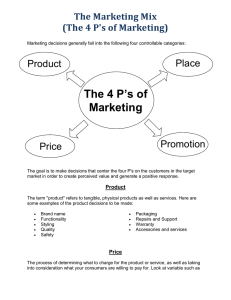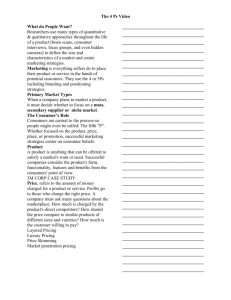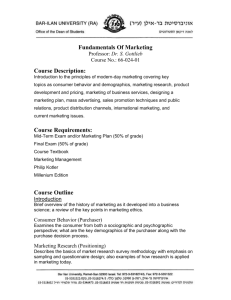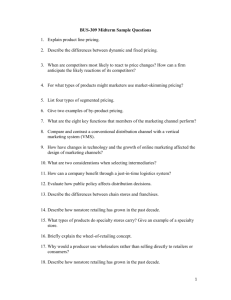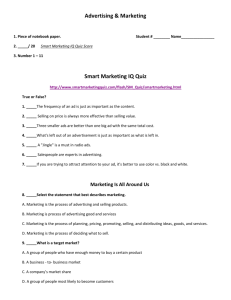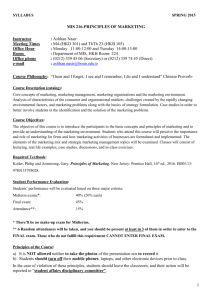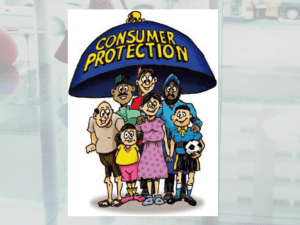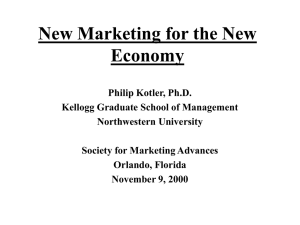Marketing * 3rd Edition Name - Marketing and DECA
advertisement
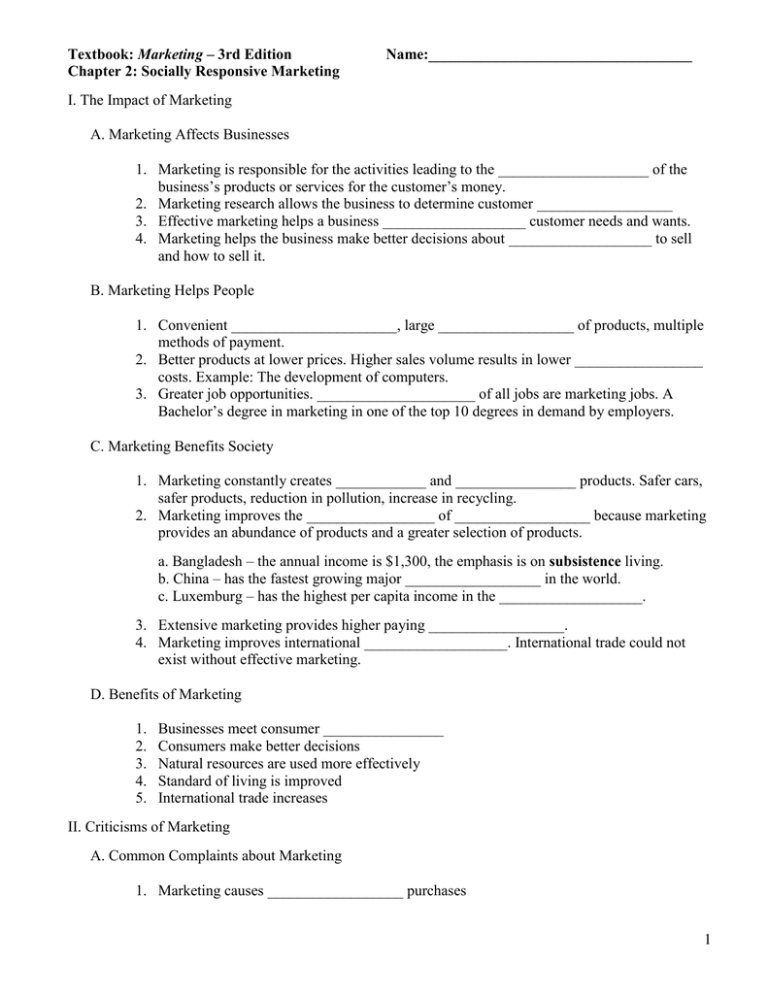
Textbook: Marketing – 3rd Edition Chapter 2: Socially Responsive Marketing Name:___________________________________ I. The Impact of Marketing A. Marketing Affects Businesses 1. Marketing is responsible for the activities leading to the ____________________ of the business’s products or services for the customer’s money. 2. Marketing research allows the business to determine customer __________________ 3. Effective marketing helps a business ___________________ customer needs and wants. 4. Marketing helps the business make better decisions about ___________________ to sell and how to sell it. B. Marketing Helps People 1. Convenient ______________________, large __________________ of products, multiple methods of payment. 2. Better products at lower prices. Higher sales volume results in lower _________________ costs. Example: The development of computers. 3. Greater job opportunities. _____________________ of all jobs are marketing jobs. A Bachelor’s degree in marketing in one of the top 10 degrees in demand by employers. C. Marketing Benefits Society 1. Marketing constantly creates ____________ and ________________ products. Safer cars, safer products, reduction in pollution, increase in recycling. 2. Marketing improves the _________________ of __________________ because marketing provides an abundance of products and a greater selection of products. a. Bangladesh – the annual income is $1,300, the emphasis is on subsistence living. b. China – has the fastest growing major __________________ in the world. c. Luxemburg – has the highest per capita income in the ___________________. 3. Extensive marketing provides higher paying __________________. 4. Marketing improves international ___________________. International trade could not exist without effective marketing. D. Benefits of Marketing 1. 2. 3. 4. 5. Businesses meet consumer ________________ Consumers make better decisions Natural resources are used more effectively Standard of living is improved International trade increases II. Criticisms of Marketing A. Common Complaints about Marketing 1. Marketing causes __________________ purchases 1 2. Marketing ___________________ money 3. Marketing is not always __________________ B. The Typical Costs of Marketing 1. The average costs of sales and advertising is __________% of product costs. 2. The average costs of ALL marketing activities is _________ % of product costs. III. Marketing Solves Problems A. Marketing increases public awareness 1. _____________________ (environmental) Marketing – consists of marketing activities designed to satisfy customer needs without negatively impacting the environment. 2. Green Marketing – is related to _________________________- environmentally sustainable development. B. Marketing helps match ____________________ with _______________________ IV. _________________ _______________________ - Concern about the consequences of actions on others. Also refers to the duty of a business to contribute to the well being of society. A. Benefits of Social Responsibility - Recognition in the community and ____________ _________. B. __________________________ - The organized actions of groups of consumers seeking to increase their influence on business practices. The societal effort to protect consumer rights by putting legal, moral, and economic pressure on business. C. Ralph ________________ is often called the father of __________________. He was the Green Party Nominee for President in 1996. He ran again as a write in candidate in the 2000 Presidential election. D. The __________________ Bill of Rights - Presented by President ___________________ in 1960 1. 2. 3. 4. The right to adequate and accurate information. The right to ____________________ products. The right to product choices. The right to communicate their opinions to business and government. V. Consumer Protection A. Influencing Business Practices 1. Using the consumer vote – don’t spend your money on the product if you don’t need or want it. 2. __________________________ – an organized effort to influence a company by refusing to purchase its products. 3. Government regulation. 2 B. Consumer Laws 1. _______________________ Antitrust Act, 1890 - To increase competition among businesses by regulating monopolies. 2. Food and Drug Act, 1906 - To control the content and labeling of food and drug products by forming the Food and Drug Administration (FDA). 3. Federal Trade Commission Act, 1914 - To form the Federal Trade Commission (FTC) to protect consumer rights. 4. _______________________________ Act, 1936 - To protect small businesses from unfair pricing practices between manufacturers and large businesses The Act prohibits selling the same product, under the same circumstances, to different customers at different prices with intent of harming competition. 5. _____________________________________, 1966 - To require packages to be accurately labeled and fairly represent the contents. The identity of the product; the name and place of business of the manufacturer, packer, or distributor; and the net quantity of contents. 6. Consumer Credit Protection Act, 1968 - To require disclosure of credit requirements and rates to loan applicants. 7. Consumer Product Safety Act, 1972 - To set safety standards and to form the Consumer Product Safety Commission (CPSC) 8. __________________________________ Act, 1990 - To prohibit discrimination and ensure equal opportunity for persons with disabilities. 9. Telemarketing and Consumer Fraud and Abuse Prevention Act, 1994 - To prohibit deceptive telemarketing practices and regulate calls made to consumers’ homes 10. Millennium Digital Commerce Act, 1999 To regulate the use of electronic contracts and signatures for Internet business transactions 11. Gramm-Leach-Bliley Financial Modernization Act, 1999 - To limit the sharing of consumer information by requiring financial services companies to inform consumers about how private information is handled VI. Improving Practices 1. ______________________ – are moral principles or values based on honesty and fairness. 2. __________________ of ethics – is a set of standards or rules that guide ethical business behavior. 3. _______________-regulation – taking personal responsibility for actions. The Better Business Bureau is an organization that works to maintain standards in business and advertising. It is supported by local businesses, they aim to serve businesses and consumers by encouraging voluntary ethical business practices and providing services to the public. 3 4. ___________________ action – many business people are concerned about the world in which they live. Many are active in helping solve some of society’s serious problems by investing time and money to help their communities. VII. Responsibilities of the Marketer A. Product development and management Disclosing all substantial risks associated with a product or service Identifying substitutions that change the product or impact buying decisions Identifying extra cost-added features B. Promotions Avoiding false and misleading advertising Rejecting high-pressure or misleading sales tactics and promotion C. Distribution Not exploiting customers by manipulating the availability of a product Not using coercion Not exerting undue influence over the reseller’s choice to handle a product D. Pricing Not engaging in price fixing Not practicing predatory pricing Disclosing the full price associated with any purchase E. Marketing research Prohibiting selling or ______________________ disguised as conducting research Avoiding misrepresentation and omission of pertinent research data Treating clients and suppliers fairly XVII. Ethics in Marketing A. _________________________ to customers – businesses have a responsibility to ensure the safety of their customers. 1. ConAgra Foods voluntarily recalled all of its peanut butter even though salmonella contamination was not found in the products. (Salmonella was detected in one factory.) B. Harm and _________________________ – many unethical business practices hurt consumers and can be illegal. 1. Bernie Madoff was sentenced to 150 years imprisonment for his part in operating a Ponzi scheme. 2. A Ponzi scheme is a fraudulent investment operation that pays returns to separate investors from their own money or money paid by other investors rather than from any actual profit earned. 4
